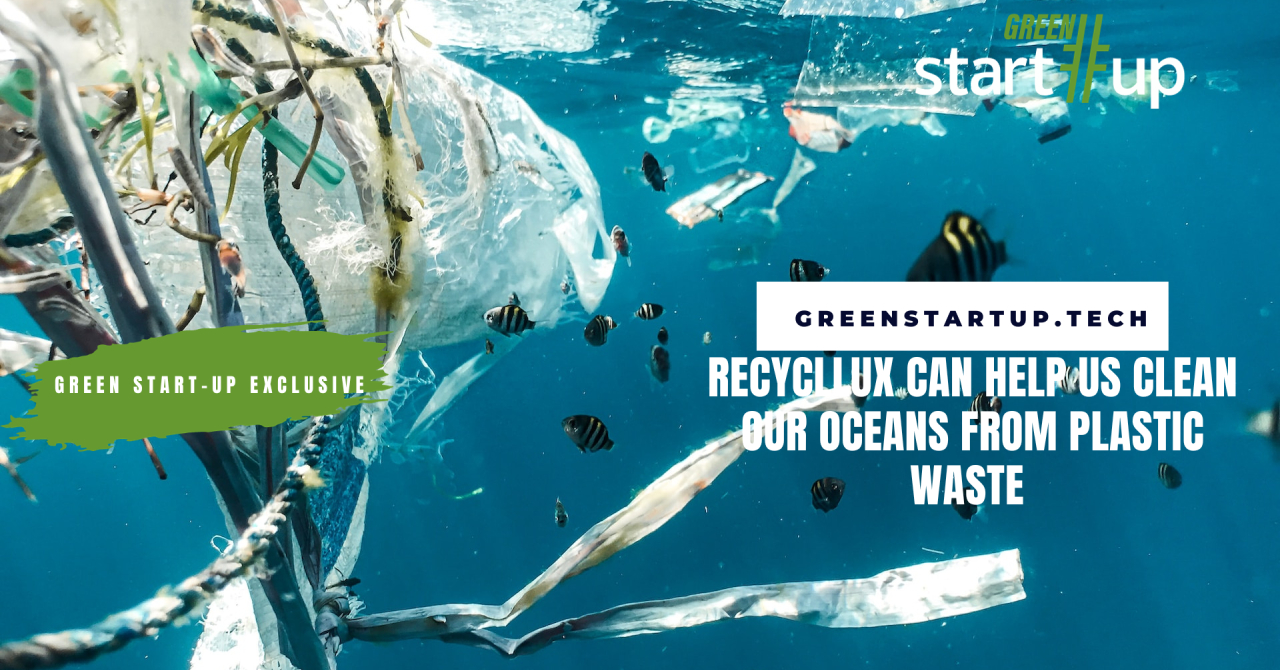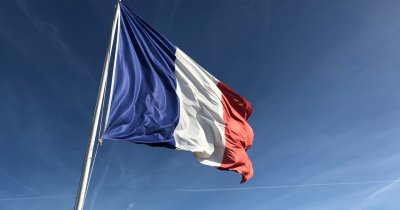What you'll learn from this story:
- How Recycllux aims to clean the seas;
- What is the total investment so far;
- How much plastic is discharged annually into the seas and oceans;
- Why it is important to prevent marine ecosystem contamination with plastic;
Although governments have their own responsibility when it comes to promoting recycling, companies have to play their part, as well, to ensure we can process and reuse the materials that can no longer be used in their initial form. Recycling is important because it reduces the consumption of natural resources and the energy required for producing new products from raw materials.
We talked to Sorina Uleia, Chief Operating Officer at Recycllux, to find out more about the company's mission and how this project was started.
Sorina first told us that they started this project with a deep desire to contribute to environmental protection and to use technology innovatively to create a cleaner, healthier, and more sustainable planet. We firmly believe that combating plastic pollution is not only the problem of seas and oceans but is a complex issue that affects climate, health, society, and the economy.
The beginnings of Recycllux
Recycllux started off in 2020, when theyit participated inat the Parsec Accelerator, an incubator funded through the Horizon 2020 program and dedicated to the development of innovative ideas that use satellite data to solve global challenges.
"Here we validated the experimental prototype and confirmed the product's market fit through interviews with various actors involved in combating marine pollution," Sorina told us.
In 2021, Recycllux was accelerated by InnovationLabs, which allowed the company to build the MVP, and that culminated in winning the "Spin-off of the year" award, as we found out from the company's representative.
Another step that significantly increased Recycllux's visibility at the European level took place in 2022 when the team participated in the Black Sea ClimAccelerator, a program organized by Impact Hub with the support of the European Institute of Innovation and Technology (EIT) Climate-KIC. Later, in 2023, EIT Climate-KIC published the project's results on the European Commission's Horizon results platform.
The total investments in Recycllux exceed 200,000 euros, of which 30,000 represent external financial investments, and 50,000 represent investments in the form of services or resources that did not involve direct financial flows. "Our team not only contributed financially to cover operational costs but also made a significant effort in the form of voluntary work and dedicated time. This unpaid contribution was essential for the development and progress of our project."
Behind Recycllux's success is a team that helps with the continuous development of the business. "We are three co-founders, each with over 20 years of experience. Alexandra is an associate professor at the Faculty of Automation and Computers at the Polytechnic University of Bucharest and an expert in digital technology, with extensive experience in artificial intelligence."
"Her knowledge in AI formed the basis of our technological approach. The machine learning algorithm for precise identification of plastic waste locations is developed based on Alexandra's PhD thesis," we found out from Sorina.
Bogdan has experience in managing complex ICT projects and brings to Recycllux an integrated technological perspective, being a well-established solutions architect in the industry.
At the same time, Sorina, the third co-founder, contributes to the brand's strategic vision and provides support in innovation management, with a solid background accumulated in corporations such as IBM or Oracle.
What are the challenges of collecting and recycling sea-recovered plastic
One of the major challenges associated with collecting and recycling the plastic from marine ecosystems is the cost linked to this process, Sorina told us, which means that finding the financial support to perform the interventions is not an easy task.

Sorina explained that "most of the existing solutions depend on the infrastructure belonging to big companies, such as Ocean Cleanup and One Earth - One Ocean. These organization use proprietary sonar-equipped ships to identify plastic waste-infested places, but can only act whenever the ships are present there."
"Recycllux, on the other hand, uses AI-based algorithms in order to identify these places remotely, based on satellite data, and accurately identifies the areas where collection efforts should be concentrated. This represents a significant change, saving valuable time and resources", she added for Green Start-Up.
Also, Recycllux is not directly involved in the collection and recycling of plastic waste from seas, but rather an ‘technological’ intermediary. Through an "uber" model, they connect companies interested in implementing sustainability actions with fishing vessels and local non-governmental organizations for waste collection and sorting, as well as with recycling companies for transforming the waste into second-generation materials.
At the same time, by optimizing available resources, such as the excess capacity of fishing boats during their inactive periods, Recycllux ensures an additional source of income and continuous activity for fishermen who want to contribute to cleaner marine ecosystems.
From Recycllux's representative, we found out that "not everyone is aware of the gravity of the marine plastic pollution issue or of the possible solutions to combat it."
Thus, to obtain the necessary funding to carry out waste collection, transportation, and recycling, the company seeks to conclude partnerships with economic actors that share the same vision of protecting marine ecosystems.
The situation of plastic waste in seas and oceans
Most of the waste that we see in marine environments does not come from nearby beaches, but rather from urban and rural sourcesfarther away. Plastic packaging and objects discarded in nature are carried by wind and runoff into rivers and then end up in marine ecosystems.
Green Start-Up learned from Sorina Uleia that "once in marine environments, these objects stay afloat and are carried by the currents to so-called "waste islands". There, plastic can accumulate and stay for long periods of time."
As plastic stays in the marine environment, under the influence of sunlight, water, and the mechanical action of waves, it gradually degrades, leading to the formation of extremely small particles called microplastics. These represent a significant problem not only for the marine ecosystems but can directly affect our health. If fish consume these particles and are then caught for consumption, humans can also become contaminated with microplastics, which are dangerous substances.
According to Sorina, "plastic represents the largest, most dangerous and most persistent problem of the seas, 85% of all waste that reaches the seas. Currently, some 165 million tons of plastic circulate around the Earth's seas and prevent them from capturing about 8.25 billion tons of CO2 per year."
She also says that, if authorities won't work in order to prevent the contamination of the seas with plastic waste, the amount that currently reaches these environments every year, 12 million tons, could triple by 2040.
Even the Black Sea is not exempt from this phenomenon, being particularly susceptible to waste accumulation. "This semi-enclosed sea has undergone significant changes due to human activities in the last four decades. The largest amounts of waste are found in the areas of the Constanta, Capul Midia, and Mangalia ports, which have intense maritime traffic. It is also estimated that 4.2 tons of plastic reach the Black Sea through the Danube River every day (1,533 tons annually)," explains Recycllux's COO.
How can Recycllux help us stop this phenomenon
Even though Recycllux's solution is not currently operational at the commercial level, the prototype's development advances permanently. Still, the impact it will have on the environment once it is used, according to the officials, can be measured and demonstrates a direct link between plastic waste removal and the reduction of CO2 emissions.
"According to our impact analysis commissioned by EIT Climate KIC, it is found that only one intervention to collect 10 tons of plastic waste from the marine environment leads to an additional absorption of 35 kg of CO2 emissions. Our scalable approach, which involves multiple subsequent interventions, has the potential to facilitate the absorption of billions of tons of CO2eq annually," we learned from Sorina Uleia.
Related to the plastic processing entities that will collaborate with Recycllux, their efforts will be rewarded. They play a crucial role in Recycllux's model despite the significant challenge posed by sustainable recycling of marine plastic waste due to its high contamination levels. "Obtaining the necessary purity for recycling, which usually involves a maximum of 5% impurities, is particularly difficult for plastic collected from saltwater."

The second solution proposed by the Romanian brand is thermal recycling, which involves the controlled incineration of waste so that it can be converted into energy.
The next steps for Recycllux
"In the next 6-12 months, we focus on rigorous testing and validation of our prototype through a real-life intervention. This crucial step will provide us with valuable data to subsequently adjust our technology and operational processes", Sorina told us.
Considering the geographical proximity of our country to the Black Sea, this will be the place where the company wants to start its commercial activity, and in this regard, strategic alliances have already been discussed, such as the one with the Ecological Non-Governmental Organization Mare Nostrum or those with fishing associations.
Thus, obtaining the necessary funding remains the main objective for 2023. In the future, operations will be optimized to ensure the most efficient waste collection.
"In the end, our fundamental goal is to have a significant and lasting impact in the global fight against marine plastic pollution", Sorina concluded.
 Mihai - Cristian Ioniță
Mihai - Cristian Ioniță












Any thoughts?